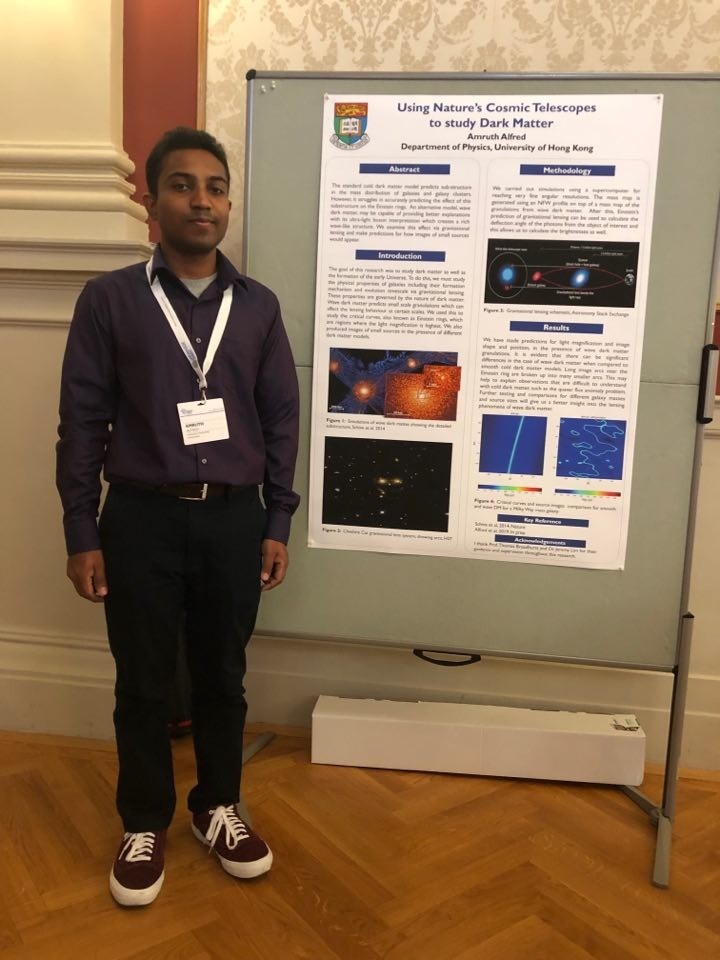Time Travelling with Giants
Time Travelling with Giants
“Magic is just science that we don’t understand
yet.” With that being the case, Amruth Alfred, a PhD student in the
Department of Physics, might have been considered a wizard a few centuries ago.
Last July, Amruth took part in Kurt Gödel’s
Legacy: Does Future lie in the Past?, a multidisciplinary conference held at
The University of Vienna. As a celebration of Gödel’s work, the Conference explored
travelling across the fields of logic, philosophy, physics and more, and honoured
the 100th anniversary of Albert Einstein's theory of general relativity.
Instead of “standing upon the shoulders of giants”, participants were invited to
travel through time – or at least, discuss its possibility – alongside them.

“Most things will most likely only be discovered after we’ve all died, But we’re still moving forward, and that’s what matters, right?”
At the conference, Amruth won a gold medal for
his presentation on his research on dark matter. “Dark matter is still a total
mystery,” explained Amruth. Still incapable of being directly observed, dark
matter remains elusive to many scientists, including Amruth, who runs computer
simulations on a dark matter model and observes the predictions.
So how is dark matter connected to time
travel? “Well,” Amruth laughed, “It’s very complicated!” In essence, he
explained, time travel might be possible due to the instabilities in space
predicted by Einstein’s theory of general relativity. Dark matter may fit into
the equation somewhere, but it seems that only time will tell.
“Most things will most likely only be
discovered after we’ve all died,” said Amruth thoughtfully. “But we’re still
moving forward, and that’s what matters, right?”
Amruth’s favourite part of the Conference is interacting
with some of the brightest minds of our generation. “It was amazing to talk to them
freely,” said Amruth. “Some people present were even old enough that their
parents actually saw Einstein!”
Were there any funny Einstein anecdotes shared
among the guests? Laughing, Amruth began, “So apparently, Gödel and Einstein
had lunch together every day when they were colleagues.”
Their assistants were very curious about what the
two talked about over lunch, so one day, the assistants secretly pulled Gödel
aside and asked. Did they spend lunchtime debating theories of the universe?
They wondered. Or did they discuss the fine points of their research?
“No,” Gödel answered, a bit nonplussed, they
talked about magazines!
“Sometimes people think that all scientists
must be stuffy nerds,” concluded Amruth with a chuckle. “But that’s a
misconception. Even Einstein was all-rounded – his theory of relativity was actually
inspired by philosophy.”
In a similar vein, he advised aspiring
scientists and undergraduates against sticking their noses into technical
handbooks only. “It’s important to have a wider view of things. Instead of only
reading textbooks, why not branch out into sci-fi and laymen science books as
well?” Amruth himself is a fan of Asimov and Arthur C. Clarke, and lists Carl
Sagan’s Cosmos as his favourite book.
As Amruth mentioned, sometimes our life’s work
only bears fruition many years after our passing. Nevertheless, “our generation
plants trees, and another gets the shade” – perhaps this benefaction, too, is a
worthy form of time travel.
Written by:
Gabrielle Tse
Year 3, Faculty of Arts and Faculty of Law
April 2020


